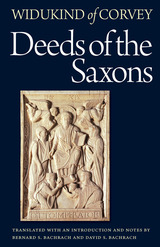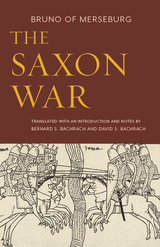2 books by Bachrach, David

Deeds of the Saxons
Widukind of Corvey
Catholic University of America Press, 2014
PleWidukind, a monk at the prominent monastery of Corvey in Saxony during the middle third of the tenth century, is known to posterity through his Res gestae Saxonicae, an exceptionally rich account of the Saxon people and the reigns of the first two rulers of the Ottonian dynasty, Henry I (919-936) and Otto I (936-973). Widukind, likely of noble birth, received a thorough education in both biblical and classical texts. When writing the Gestae, Widukind also had available the extensive library at Corvey, with its large collection of ancient texts as well as numerous works from the eighth and ninth centuries. Widukind drew on these, and even more contemporary written sources to complement and inform orally transmitted information that he received from many sources including people closely associated with the Ottonian royal court. Widukind wrote the Res gestae from the 950s to the 970s, incorporating additional material as he obtained further information and as major new events took place in the German kingdom and beyond. After providing a historical background for the Saxon people Widukind devotes most of his attention to the political and military affairs of the German kingdom, concentrating heavily on affairs of the royal court. Widukind provides information that can be found in no other source. His close relationship with the royal court enabled him to provide an "insider's" view of the people and events that shaped the political and military history of the most powerful kingdom in Europe. As a consequence, the Res gestae is an indispensable account for the history of the German kingdom during the tenth century. Bernard S. Bachrach and David S. Bachrach provide an introduction to the text that contextualizes the author, his historical methods, and the information that he provides. They draw on a large number of other written sources of information, including both narrative works and the political, economic, social, and military affairs of the day, and provide an extensive apparatus of notes.
ase fill in marketing copy
[more]

The Saxon War
Bruno of Merseburg
Catholic University of America Press, 2022
Bruno, a cleric who served the archbishop of Magdeburg and subsequently the bishop of Merseburg during the course of the 1060s to the 1080s, composed one of the most important historical works treating the tumultuous period in the history of the German kingdom in the second half of the eleventh century. Bruno’s main focus in his Saxon War is the civil wars that engulfed the German kingdom from the mid 1060s through the end of the 1080s. However, as a historian of contemporary affairs, Bruno also offers crucial insights regarding the so-called Investiture Controversy, which Bruno treats largely as a political conflict between a tyrannical German ruler and the Saxons with some papal intervention, social conflict within the German kingdom, as well as the development of economic and military institutions.
Unlike his contemporary Lampert of Hersfeld, Bruno was closely connected to the foremost leaders of the Saxon resistance against King Henry IV, and provides unique insights regarding their plans, hopes, and fears. Bruno also provides nearly two dozen full-text copies of letters that were sent by the main participants in the intra-German conflict as well as ten letters from Pope Gregory VII, four of which do not appear in any other source including the papal register.
An additional important feature of Bruno’s history is that he treats military matters in an extraordinarily detailed manner, and is the most important narrative source for understanding the conduct of war during the second half of the eleventh century. Bruno’s detailed treatment of military matters is based upon his very extensive contacts with leading military figures, as well as his own personal observations regarding the numerous battles that punctuated the struggle between the Saxons and their erstwhile ruler.
In sum, Bruno offers both unique perspectives and unique information about a crucial period in both German and European history, which make this text valuable not only for scholars, but also for a broader audience interested in the political, religious, and particularly military history of the eleventh century. This will be the first English translation of this work.
[more]
READERS
Browse our collection.
PUBLISHERS
See BiblioVault's publisher services.
STUDENT SERVICES
Files for college accessibility offices.
UChicago Accessibility Resources
home | accessibility | search | about | contact us
BiblioVault ® 2001 - 2024
The University of Chicago Press









